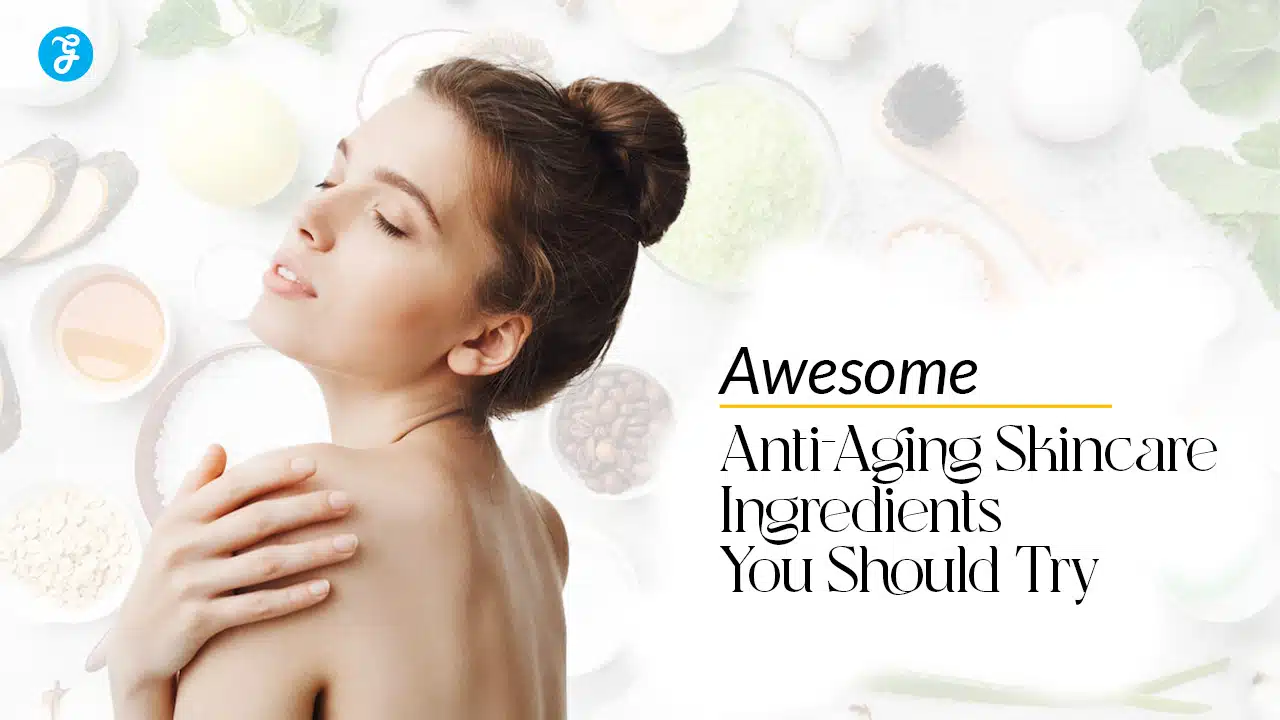Aging is a natural part of life, but it’s possible to keep your skin looking youthful and radiant by using the right ingredients in your skincare routine.
Many anti-aging skincare ingredients help combat fine lines, wrinkles, age spots, and loss of elasticity by nourishing the skin and boosting its regeneration.
In this detailed guide, we will explore 10 effective anti-aging skincare ingredients that you can easily incorporate into your at-home skincare regimen.
These ingredients are not only powerful but also accessible, making it easier for you to achieve younger-looking skin.
Why Anti-Aging Ingredients Matter in Skincare
As we age, our skin’s natural ability to produce collagen and retain moisture diminishes, leading to wrinkles, fine lines, and sagging. Using targeted skincare ingredients helps replenish moisture, stimulate collagen production, and protect the skin from environmental damage, all of which can slow down the visible signs of aging.
Benefits of Anti-Aging Skincare Ingredients
- Boost Collagen Production: Many anti-aging ingredients help the skin generate collagen, the protein responsible for skin elasticity and firmness.
- Enhance Skin Hydration: Proper hydration plumps the skin and smooths fine lines.
- Reduce Wrinkles and Fine Lines: Ingredients with regenerative properties reduce the appearance of aging by encouraging skin cell turnover.
- Brighten Skin Tone: Anti-aging ingredients can fade dark spots and improve overall complexion.
1. Retinol (Vitamin A)
Retinol, a derivative of Vitamin A, is one of the most well-known and researched anti-aging ingredients. It works by speeding up cell turnover, boosting collagen production, and smoothing out fine lines and wrinkles. Retinol also helps treat acne and hyperpigmentation, making it a multi-tasking skincare ingredient.
Key Benefits of Retinol
- Stimulates Collagen: Retinol helps improve skin elasticity by boosting collagen production.
- Reduces Wrinkles: Regular use of retinol can significantly reduce the appearance of fine lines and deep wrinkles.
- Improves Skin Texture: It promotes smoother, softer skin by increasing cell renewal.
How to Use Retinol
- Start Slowly: If you’re new to retinol, start with a lower concentration and gradually build up to avoid irritation.
- Use at Night: Retinol can increase your skin’s sensitivity to sunlight, so it’s best to apply it at night.
- Moisturize: Always follow up with a good moisturizer, as retinol can sometimes cause dryness.
2. Hyaluronic Acid
Hyaluronic acid is a naturally occurring molecule in the skin that retains moisture, keeping the skin plump and hydrated. As we age, our skin loses hyaluronic acid, which leads to dryness and fine lines. By incorporating hyaluronic acid into your skincare routine, you can restore moisture and achieve a more youthful complexion.
Key Benefits of Hyaluronic Acid
- Deep Hydration: Hyaluronic acid can hold up to 1,000 times its weight in water, making it an exceptional hydrator.
- Plumps the Skin: It fills in fine lines and wrinkles by delivering moisture deep into the skin.
- Gentle for All Skin Types: Hyaluronic acid is suitable for all skin types, including sensitive skin.
How to Use Hyaluronic Acid
- Apply on Damp Skin: For maximum absorption, apply hyaluronic acid to slightly damp skin.
- Layer Under Moisturizer: Use it under a moisturizer to lock in hydration and create a protective barrier.
- Morning or Night: Hyaluronic acid can be used both in the morning and at night for continuous hydration.
3. Vitamin C (Ascorbic Acid)
Vitamin C is a potent antioxidant that protects the skin from free radical damage caused by UV exposure and pollution. It also helps brighten the skin, fade dark spots, and boost collagen production, making it a vital ingredient for maintaining a youthful glow.
Key Benefits of Vitamin C
- Fights Free Radicals: As an antioxidant, Vitamin C neutralizes free radicals that can accelerate aging.
- Brightens the Complexion: Vitamin C helps reduce dark spots and evens out skin tone, resulting in a brighter complexion.
- Boosts Collagen: It stimulates collagen production, helping to firm the skin and reduce wrinkles.
How to Use Vitamin C
- Use in the Morning: Apply Vitamin C serum in the morning to protect your skin from environmental damage throughout the day.
- Layer with Sunscreen: Vitamin C enhances the effectiveness of sunscreen, so pair it with SPF for optimal protection.
- Avoid Mixing with Retinol: Since Vitamin C and retinol have different pH levels, it’s best to use them at separate times of the day.
4. Niacinamide (Vitamin B3)
Niacinamide is a form of Vitamin B3 that offers multiple anti-aging benefits, including improving skin elasticity, enhancing the skin barrier, reducing fine lines, and calming inflammation. It’s a great choice for anyone looking for a versatile ingredient that suits all skin types.
Key Benefits of Niacinamide
- Improves Elasticity: Niacinamide strengthens the skin’s barrier, making it more resilient and firm.
- Reduces Fine Lines: Regular use of niacinamide can minimize the appearance of fine lines and wrinkles.
- Soothes Irritation: It has anti-inflammatory properties that help calm redness and irritation, making it suitable for sensitive skin.
How to Use Niacinamide
- Use Daily: Niacinamide is gentle enough to use daily, either morning or night.
- Layer Under Moisturizer: Apply niacinamide serum before your moisturizer to enhance hydration and lock in moisture.
- Combine with Other Ingredients: Niacinamide pairs well with other active ingredients like hyaluronic acid and retinol.
5. Peptides
Peptides are short chains of amino acids that act as building blocks for proteins like collagen and elastin, which are essential for maintaining skin firmness and elasticity. Incorporating peptides into your skincare routine can help improve skin texture and reduce the appearance of fine lines.
Key Benefits of Peptides
- Boosts Collagen Production: Peptides encourage the skin to produce more collagen, improving firmness.
- Reduces Wrinkles: By promoting collagen and elastin production, peptides help smooth out wrinkles and fine lines.
- Supports Skin Repair: Peptides aid in the skin’s natural repair process, helping to heal and regenerate damaged skin.
How to Use Peptides
- Look for Multi-Peptide Formulas: Opt for products that contain a blend of different peptides for maximum benefits.
- Use Twice a Day: Peptide serums can be used both morning and night for continuous anti-aging effects.
- Pair with Hydrating Ingredients: Peptides work well with hydrating ingredients like hyaluronic acid for a plump and youthful appearance.
6. Alpha Hydroxy Acids (AHAs)
Alpha Hydroxy Acids (AHAs), such as glycolic acid and lactic acid, are natural exfoliants that help remove dead skin cells, revealing fresher, younger-looking skin. AHAs are particularly effective in reducing the appearance of fine lines, evening out skin tone, and improving skin texture.
Key Benefits of AHAs
- Exfoliates Gently: AHAs provide chemical exfoliation that is gentler than physical scrubs, making them ideal for aging skin.
- Promotes Cell Turnover: By accelerating cell renewal, AHAs help reduce the appearance of wrinkles and fine lines.
- Brightens Skin Tone: Regular use of AHAs can lighten dark spots and improve skin clarity.
How to Use AHAs
- Start with Low Concentrations: If you’re new to AHAs, start with a low concentration (around 5%) to avoid irritation.
- Apply at Night: Use AHA products at night, as they can increase your skin’s sensitivity to the sun.
- Follow with Sunscreen: Always wear sunscreen during the day when using AHAs, as they make your skin more vulnerable to UV damage.
7. Ceramides
Ceramides are lipids (fats) that are naturally found in the skin’s outer layer and are essential for maintaining a healthy skin barrier. As we age, our skin’s ceramide levels decrease, leading to dryness, irritation, and a weakened barrier. Using ceramide-based products helps restore the skin’s barrier function, keeping it hydrated and protected.
Key Benefits of Ceramides
- Restores the Skin Barrier: Ceramides strengthen the skin’s protective barrier, preventing moisture loss.
- Reduces Irritation: They soothe and repair dry, sensitive skin, reducing redness and irritation.
- Locks in Hydration: Ceramides help retain moisture, keeping the skin hydrated and plump.
How to Use Ceramides
- Apply After Cleansing: Use ceramide-based creams or serums after cleansing to lock in moisture and protect the skin barrier.
- Layer with Hydrating Ingredients: Combine ceramides with hydrating ingredients like hyaluronic acid to maximize moisture retention.
- Use Daily: Ceramides are gentle enough for daily use, morning and night, especially if you have dry or sensitive skin.
8. Coenzyme Q10 (CoQ10)
Coenzyme Q10, or CoQ10, is a naturally occurring antioxidant that helps produce energy in skin cells. As we age, the production of CoQ10 decreases, leading to less energy for skin repair and regeneration. By applying CoQ10 topically, you can boost skin cell activity, reduce fine lines, and improve overall skin health.
Key Benefits of CoQ10
- Fights Free Radicals: CoQ10 neutralizes free radicals, protecting the skin from oxidative stress that leads to premature aging.
- Promotes Skin Repair: It supports the production of energy in skin cells, aiding in skin repair and regeneration.
- Reduces Wrinkles: CoQ10 reduces the appearance of fine lines and wrinkles by boosting collagen production and preventing UV damage.
How to Use CoQ10
- Use with Antioxidants: CoQ10 works well when combined with other antioxidants like Vitamin C for enhanced protection against free radicals.
- Morning Application: Apply CoQ10 in the morning to help defend against daily environmental stressors.
- Suitable for All Skin Types: CoQ10 is gentle and effective for all skin types, including sensitive skin.
9. Green Tea Extract
Green tea extract is packed with polyphenols, which are powerful antioxidants that help reduce inflammation, combat free radicals, and soothe the skin. Its anti-aging properties help diminish signs of aging, such as wrinkles, sagging, and sun damage.
Key Benefits of Green Tea Extract
- Reduces Inflammation: The anti-inflammatory properties of green tea soothe redness and irritation, making it ideal for sensitive and acne-prone skin.
- Fights Free Radicals: Green tea’s antioxidants neutralize free radicals, preventing skin damage caused by UV exposure and pollution.
- Prevents Premature Aging: Regular use of green tea extract can prevent the breakdown of collagen, reducing the appearance of wrinkles and fine lines.
How to Use Green Tea Extract
- Apply as a Serum: Use green tea extract serums in the morning to protect against environmental stressors throughout the day.
- Combine with Sunscreen: Pair green tea extract with sunscreen for enhanced protection against UV-induced skin damage.
- Suitable for All Skin Types: Green tea extract is gentle and calming, making it a great option for all skin types, including sensitive and acne-prone skin.
10. Rosehip Oil
Rosehip oil is a natural, plant-based oil rich in vitamins A, C, and essential fatty acids. It’s well known for its ability to deeply moisturize the skin, reduce the appearance of scars, and combat fine lines and wrinkles.
The antioxidants in rosehip oil promote skin regeneration and improve skin texture, making it a popular anti-aging ingredient.
Key Benefits of Rosehip Oil
- Rich in Antioxidants: Rosehip oil contains vitamins A and C, which promote skin regeneration and help reduce wrinkles and fine lines.
- Moisturizes Deeply: The essential fatty acids in rosehip oil penetrate deeply into the skin, locking in moisture and improving hydration.
- Fades Scars and Pigmentation: Regular use of rosehip oil can fade scars, hyperpigmentation, and sun damage, evening out the skin tone.
How to Use Rosehip Oil
- Apply at Night: Use rosehip oil at night as a nourishing treatment to restore skin hydration and repair damage.
- Mix with Moisturizer: Blend a few drops of rosehip oil with your daily moisturizer for extra hydration.
- Perfect for Dry Skin: Rosehip oil is especially beneficial for dry and mature skin, as it delivers intense moisture and helps reduce wrinkles.
Takeaway: Elevate Your Anti-Aging Skincare Routine
Incorporating the right anti-aging ingredients into your at-home skincare routine can dramatically improve your skin’s texture, elasticity, and overall appearance.
From the hydration-boosting properties of hyaluronic acid to the wrinkle-reducing benefits of retinol and peptides, these 10 ingredients are powerful allies in the fight against aging.
By tailoring your skincare regimen to include these active ingredients, you can address common signs of aging—such as fine lines, wrinkles, and loss of firmness—while keeping your skin healthy and radiant.
Consistency is key, so start integrating these anti-aging skincare ingredients into your routine today for long-term benefits and youthful, glowing skin.











































